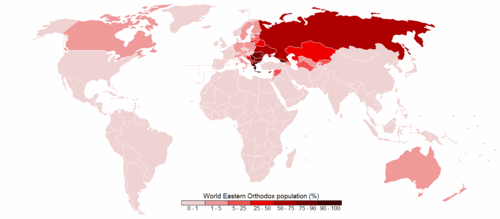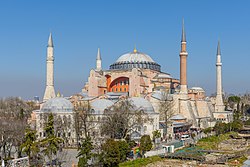Eastern Orthodox Church
The Eastern Orthodox Church, officially the Orthodox Church, is a Christian church. Their type of Christianity is also called Orthodox Christianity or Orthodoxy. Their members are called Orthodox Christians, while there is similar type of Christianity called the Oriental Orthodoxy, whose churches are not in communion with the Eastern Orthodox Church.
Overview
There are about 300 million Orthodox Christians in the world. Most Orthodox Christians are found in Eastern Europe and the Middle East.
The Eastern Orthodox Church teaches that it is the Church started by Jesus Christ in his instructions to the Apostles. It practices what it understands to be the original Christian faith and maintains the sacred tradition passed down from the apostles. The worship service is known as the Divine Liturgy. The beliefs and rituals of the service are similar to the Eucharist in the Roman Catholic Church.
History
In 395, the Roman Empire was split into a western part and an eastern part. The western part lasted to the 5th or 6th century. Τhe exact dates are a point of debate. The eastern part, which is commonly called Byzantine Empire, lasted until the 15th century. The split of the Roman Empire also affected the church, which developed differently in both parts.
East-West Schism
In 1054, there was the Great Schism. The western part developed what is now the Roman Catholic Church, and the eastern part is now called Eastern Orthodox Church. In Western Europe, there is the Patriarch of Rome, who is commonly called the Pope.
In Eastern Europe, there is the Patriarch of Constantinople. Because of such historical development, many Eastern Orthodox churches also have a local Patriarch. In the west, the Pope is an absolute leader. The Patriarch of Constantinople is the "first among equals". His power is not absolute, as seen when meeting with other Patriarchs. His power is the same of all bishops.
Doctrines
Some holidays include Christmas and Easter.
Orthodox believe in everything in the Nicene Creed:
- I believe in one God, the Father, the Almighty, Creator of heaven and earth and of all things visible and invisible.
- And in one Lord Jesus Christ, the only begotten Son of God, begotten of the Father before all ages.
- Light of Light, true God of true God, begotten not created, of one essence with the Father through whom all things were made.
- For us men and for our salvation He came down from heaven and was incarnate with the Holy Spirit and the Virgin Mary and became man.
- He was crucified for us under Pontius Pilate, and He suffered and was buried.
- On the third day He rose according to the Scriptures.
- He ascended into heaven and is seated at the right hand of the Father.
- He will come again in glory to judge the living and dead. His kingdom shall have no end.
- And in the Holy Spirit, the Lord, the Giver of life, who proceeds from the Father, who together with the Father and the Son is worshiped and glorified, who spoke through the prophets.
- In One, Holy, Catholic, and Apostolic Church.
- I acknowledge one baptism for the forgiveness of sins.
- I expect the resurrection of the dead.
- And the life of the ages to come. Amen.
- In summary, they believe in one God, who consists of three Persons (Father, Son & Spirit) who are one and the same (of one essence). As the Son (Jesus), He arrived from Heaven, died, and resurrected. He will eventually return as a Judge for all of humanity, as described in the Bible.
Today
The many churches of the Orthodox Church are distinct in terms of administration and local culture, but for the most part exist in full communion with one another. Most of these churches are led by patriarchs. Most patriarchs recognize the Patriarch of Constantinople as their spiritual leader.
The following listing contains a selection of Eastern Orthodox Churches. Unless otherwise stated, they are in communion with:
- Church of Mount Sinai
- Greek Orthodox Church
- Russian Orthodox Church
- Serbian Orthodox Church
- Albanian Orthodox Church
- Georgian Orthodox Church
- Bulgarian Orthodox Church
- Romanian Orthodox Church
- Antiochian Orthodox Church
- Greek Orthodox Church of Alexandria
- Russian Orthodox Church Outside Russia
- Mount Athos, a community of monasteries
In the 17th century, a group of people split from the Russian Orthodox Church because they objected to some changes. These people are known as Old Believers today. There are two big groups of Old Believers and a few smaller ones. Old Believers are not in communion with the other Eastern Orthodox Churches.
Eastern Orthodox Church Media
Christ Pantocrator, sixth century, Saint Catherine's Monastery, Sinai; the oldest known icon of Christ, in one of the oldest monasteries in the world
Emperor Constantine presents a representation of the city of Constantinople as tribute to an enthroned Mary and baby Jesus in this church mosaic (Hagia Sophia, c. 1000).
Eastern Orthodox icon of St. John the Baptist, 14th century, North Macedonia
An icon depicting the Emperor Constantine and the bishops of the First Council of Nicaea (325) holding the Niceno–Constantinopolitan Creed of 381
The Hagia Sophia, the largest church in the world and patriarchal basilica of Constantinople for nearly a thousand years, later converted into a mosque, then a museum, then back to a mosque
The baptism of Princess Olga in Constantinople, a miniature from the Radziwiłł Chronicle
Latin Crusaders sacking the city of Constantinople, the capital of the Eastern Orthodox–controlled Byzantine Empire, in 1204
Uspenski Cathedral, a main cathedral of the Finnish Orthodox Church in Helsinki, Finland, was built under Imperial Russia.
Related pages
References
The Orthodox Church; 455 Questions and Answers. Harakas, Stanley H. Light and Life Publishing Company, 1988. (ISBN 0-937032-56-5)
The Orthodox Church New Edition Publisher: Penguin (Non-Classics); 2 edition
Other websites
| Wikimedia Commons has media related to Lua error in Module:Commons_link at line 62: attempt to index field 'wikibase' (a nil value).. |
- OrthodoxWiki
- Orthodox Research Institute
- List of most patriarchates Archived 2007-07-01 at the Wayback Machine
- Directory of Orthodox Internet Resources Archived 2009-02-10 at the Wayback Machine
- PATRIARCHIA.RU










